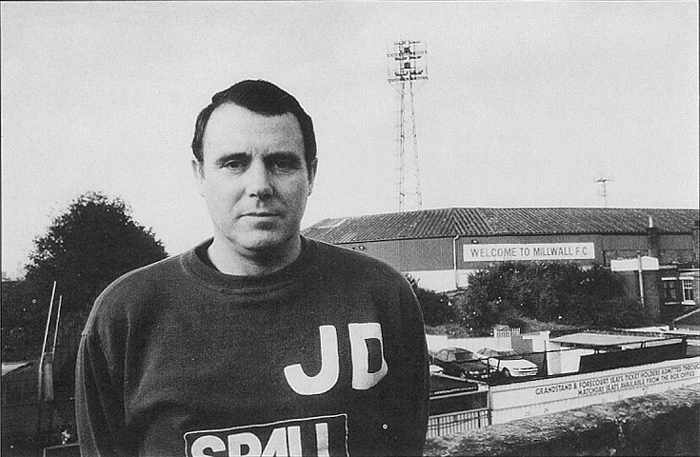

 |
 |
| Home | 1988/89 | Previous | Next |
John Docherty, Manager. “Players grew away from fans, not through any will on their part, but just by the evolution of football and the money that came into the game. That was sad. When League football clubs began, their players were people who had grown up in that area, or they were imported players who lived amongst the fans in that area. This meant a club's style of football tended to reflect the values of the people in that area. Football literally arose from the people.” “The tactical development of the game meant those styles had to be modified. The game became a professional matter. But some clubs resisted this change. They insisted on retaining the playing style they felt suited them. As a result, they found themselves to be comparatively less successful. Other clubs who were prepared to adjust went on to become more successful.” “The media and transport are the other reasons this happened. Since television developed, people have chosen teams from what they grew up with on TV, and the media only focus on successful sides. Then motorways developed, and people could go and watch sides in another part of the country. You got people in Cornwall with Cornish accents saying they are Liverpool supporters. So by these processes, our game became Americanised, we came to only follow success.” |
 |
|
|
“Millwall are one of the few clubs who have retained the style that reflects their area, their people. The difference is the locality, and the feeling that the community does relate to the football club. It probably goes back to when the team was associated with dockers. Generations later, we still get their descendants coming to watch the team from places as far a field as St Neots, and Southampton. The club means so much to them. I am very conscious of that. Especially last year, when we won promotion. I was very conscious of what that meant to people who had stood on the terraces here for 40 years.” “Being deprived of success, I think Millwall fans went through a period of having an isolationist view, a siege mentality. It is only in the last two years that we have started to bring them out of that, and give them something to be proud of. That coincided with success on the field.” "We got that by working with the characteristics of the club, particularly those that related to the area. If you have a competitive team at this club, you reflect the area. If there is a sincerity about the Millwall team you build, if it is honest, you are identifying with this area. If it is a team which is proud to wear the shirt, you are identifying |
with theis area. My job is to give this area a team it can feel pride in, and one that can also be successful.” “But you've got to be sensible about this. From the media point of view this is a deprived, hard area that is looked on as being difficult. So they think that a hard and dour team that is produced from such an area must be symbolic of it. They categorise Millwall in that way. But if you look deeper into the community, you see the warmth, you see the friendliness, and the sincerity of the people. You have to get those elements into the side as well It is a mixture.” “In practical terms this means Millwall fans like the big archetypal centre-half, good and dominating in the air, and they like the classic centre-forward, big and bustling, getting into the penalty area. But they also admire subtlety and skill on the ball. They have always had ball-playing wingers here.” “Traditionally, they have always had teams which tend to be a blend, people who will give them a hundred per cent, but at the same time, there will be players with skill in the team. If you get that blend right, you can achieve more than you might think possible.” “The things that appeal to this crowd, as I see it, also appeal to me. In many ways, I have joined a club which suits my personality and ideals. When I look at a potential player, I think 'Is he a Millwall player?’ |
A player has to fit, not necessarily into the locality, but into the identity of the club.” “I have always wanted to know the history of any club I played for. At Brentford, I was fortunate enough to find a couple of scrapbooks, with details of former players, and so forth. Wherever I have been, I swot up the history of the area. This creates a bond, it helps you reach an affinity with the city or town, and the club itself. Sheffield United had a lot of Yorkshire-born players. They had a great fervour for playing for the local team. This sustains you. In adversity, you come closer together.” "No matter how successful we become, we have got to build on our close liaison with the community. In the early days, there is no great difficulty in going out in to the community. But when you become successful, going out into the community can pose problems. Everybody wants to know you then. Whereas before it was you who was going to them, and encouraging them." "We have to make sure that community work does not infringe on what we do Professionally. But providing we understand that, I think the two work naturally together. What players do in the community keeps their feet on the ground, it prevents us getting too far away from our roots. This club is taking football back to its roots, and we all benefit from that." John Docherty, Manager. |
| Home | 1988/89 | Previous | Next |
The Millwall History Files The Millwall Story since the early 1980's
[Home] [Contents]
[Links] [Search] |